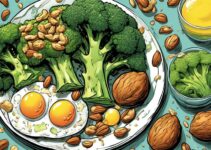When it comes to optimizing your testosterone levels, diet plays a crucial role. You may already be aware that exercise and lifestyle choices can influence your hormonal balance, but have you considered the impact of what you eat? The connection between diet and testosterone levels is a complex and fascinating one, and understanding the intricate relationship between the two can provide valuable insights into enhancing your overall health and well-being. Let's explore the intricate interplay between your dietary choices and testosterone production, and how certain nutrients can either support or hinder this critical hormone.
Key Takeaways
- Adequate protein intake is crucial for testosterone production.
- Vitamins and minerals, such as vitamin D, zinc, and magnesium, are important for hormone regulation and testosterone production.
- Consuming healthy fats, like monounsaturated and polyunsaturated fats, can positively influence testosterone levels.
- Regular exercise, particularly resistance training and high-intensity interval training, can increase testosterone levels.
Macronutrients and Testosterone
The consumption of macronutrients plays a crucial role in regulating testosterone levels in the body, impacting overall hormonal balance and physiological function. Among macronutrients, protein sources have been particularly linked to hormonal health, including testosterone regulation. Proteins are essential for the synthesis of hormones, including testosterone. Research has shown that inadequate protein intake can lead to reduced testosterone production, affecting overall hormonal balance. Furthermore, specific amino acids found in protein sources play a vital role in supporting testosterone levels. For instance, studies have highlighted the significance of amino acids such as leucine and arginine in promoting testosterone synthesis and secretion.
Moreover, the type and quality of protein sources can also influence testosterone levels. Animal-based protein sources, such as lean meats, eggs, and dairy products, have been associated with supporting healthy testosterone levels. These sources provide essential amino acids and are rich in nutrients that are crucial for testosterone production. On the other hand, research suggests that plant-based protein sources may have varying effects on testosterone levels. While some plant-based proteins like soy have been linked to potential estrogenic effects that may impact testosterone, others like quinoa and buckwheat offer beneficial amino acids that can support overall hormonal health.
Micronutrients and Hormonal Balance
Pivoting from the discussion on macronutrients and testosterone regulation, examining the role of micronutrients in maintaining hormonal balance is essential for understanding the comprehensive impact of diet on testosterone levels. Micronutrients such as vitamins and minerals play a crucial role in hormone regulation, particularly within the endocrine system. Vitamin deficiency, for instance, can significantly disrupt the delicate balance of hormones, including testosterone.
Vitamins and minerals are vital for the synthesis and regulation of hormones. For example, Vitamin D has been extensively linked to testosterone levels, with research suggesting that a deficiency in Vitamin D is associated with lower testosterone levels. Additionally, nutrients like zinc and magnesium are known to play pivotal roles in testosterone production. Zinc, in particular, is a key component of the molecular structure of testosterone and also aids in its regulation.
Moreover, micronutrients facilitate nutrient absorption, which is vital for overall endocrine system function. For instance, Vitamin C enhances the absorption of non-heme iron, crucial for transporting oxygen and supporting metabolism. This, in turn, can indirectly impact hormonal balance.
Understanding the intricate relationship between micronutrients and hormonal balance is imperative in comprehending the multifaceted influence of diet on testosterone levels. Ensuring adequate intake of these micronutrients through a balanced diet is fundamental for maintaining optimal hormonal balance, including testosterone regulation.
Impact of Dietary Fats on Testosterone
When it comes to the impact of dietary fats on testosterone levels, it's important to consider the types of fats consumed and their effects on hormone production. Research suggests that certain types of dietary fats, such as monounsaturated and saturated fats, may have different effects on testosterone levels. Understanding the recommended intake of these fats in relation to testosterone production can provide valuable insights into dietary strategies for optimizing hormonal balance.
Types of Dietary Fats
Consuming unsaturated fats has been shown to positively influence testosterone levels in the body, according to scientific research. Healthy fats, particularly monounsaturated and polyunsaturated fats, play a crucial role in lipid metabolism and can contribute to optimizing testosterone production. Research suggests that incorporating these healthy fats into your diet can lead to improved testosterone levels. When considering dietary fats, it's important to prioritize sources such as avocados, nuts, seeds, and fatty fish, which are rich in monounsaturated and polyunsaturated fats. These fats not only support overall health but also have a positive impact on testosterone levels. By including these healthy fats in your diet, you can potentially enhance lipid metabolism and promote the optimal production of testosterone in your body.
Effects on Testosterone
Incorporating healthy fats rich in monounsaturated and polyunsaturated fats into your diet has been shown to positively influence testosterone levels in the body, according to scientific research. Studies have indicated that these dietary fats play a significant role in supporting testosterone production. Furthermore, engaging in regular physical exercise has been linked to increased testosterone levels, with resistance training and high-intensity interval training showing particular promise. Exercise not only directly impacts testosterone levels but also contributes to stress management, which is another crucial factor in testosterone regulation. Chronic stress has been associated with decreased testosterone levels, highlighting the importance of stress-reducing activities such as mindfulness, meditation, and adequate sleep. By integrating both healthy dietary fats and regular exercise into your lifestyle, you can effectively support testosterone levels and overall well-being.
Recommended Fat Intake
To optimize testosterone levels through your diet, it is essential to consider the recommended intake of dietary fats, particularly those rich in monounsaturated and polyunsaturated fats. When it comes to fat sources, focus on incorporating foods such as avocados, nuts, seeds, and fatty fish into your diet to ensure an adequate intake of monounsaturated and polyunsaturated fats. These fats play a crucial role in supporting hormonal balance, including testosterone production. Additionally, it is important to limit the consumption of trans fats and saturated fats, as these have been associated with adverse effects on testosterone levels. By prioritizing the consumption of healthy fats from sources like olive oil, salmon, and flaxseeds, you can positively impact your hormonal health and support optimal testosterone levels.
Role of Protein in Testosterone Production
When it comes to understanding the role of protein in testosterone production, it's essential to consider the impact of dietary protein on testosterone levels. Research suggests that consuming adequate amounts of protein is crucial for maintaining optimal testosterone levels. By examining the relationship between protein intake and testosterone production, we can gain insights into the dietary factors that influence hormonal balance.
Protein and Testosterone
Consuming adequate protein is essential for maintaining optimal testosterone levels in the body. Protein plays a crucial role in testosterone production through various mechanisms:
- Protein Synthesis: Adequate protein intake is necessary for the process of protein synthesis, which is vital for the development and repair of muscles. Testosterone is essential for muscle building, and sufficient protein supports this process.
- Testosterone Levels: Research suggests that protein intake positively correlates with testosterone levels. A balanced diet with an adequate amount of protein can help support healthy testosterone levels in the body.
- Hormone Production: Proteins are the building blocks for hormones, including testosterone. Ensuring sufficient protein intake supports the body's overall hormone production, including testosterone.
Therefore, ensuring that your diet includes enough protein is crucial for supporting optimal testosterone levels and overall hormonal balance.
Dietary Impact on Testosterone
You play a critical role in maintaining optimal testosterone levels by ensuring that your diet includes sufficient protein, which is essential for testosterone production and overall hormonal balance. Protein intake influences the body's production of sex hormone-binding globulin (SHBG), which binds to testosterone and influences its availability for use in the body. Additionally, protein consumption impacts the levels of other hormones, such as insulin and insulin-like growth factor 1 (IGF-1), which can further affect testosterone production. Furthermore, stress can have a negative impact on testosterone levels, as chronic stress can lead to increased cortisol levels, which in turn can suppress testosterone production. On the other hand, regular physical exercise has been shown to positively influence hormonal balance, potentially leading to increased testosterone levels. Therefore, a diet rich in protein, combined with stress management and regular exercise, can play a significant role in maintaining healthy testosterone levels.
Carbohydrates and Testosterone Regulation
Carbohydrates play a significant role in regulating testosterone levels in the body. The impact of carbohydrates on testosterone levels is multifaceted and can be influenced by various factors, including exercise, sleep quality, and overall dietary intake.
- Carbohydrates and exercise:
- Consuming an adequate amount of carbohydrates before and after exercise can help maintain stable blood sugar levels and prevent the release of cortisol, a hormone that can negatively impact testosterone production.
- Engaging in high-intensity or prolonged exercise without sufficient carbohydrate intake may lead to increased cortisol levels, which can subsequently lower testosterone levels.
- It's essential to strike a balance in carbohydrate consumption, particularly for individuals engaging in regular physical activity, to support optimal testosterone regulation.
- Testosterone and sleep quality:
- Research has shown that insufficient sleep can disrupt the body's hormonal balance, including testosterone levels.
- Carbohydrate consumption can impact sleep quality, with low-carb diets potentially affecting serotonin production, which is crucial for regulating sleep.
- Ensuring adequate carbohydrate intake, particularly from complex sources, can support serotonin production and contribute to improved sleep quality, thus indirectly influencing testosterone regulation.
Understanding the intricate relationship between carbohydrates, exercise, sleep quality, and testosterone regulation is essential for optimizing overall health and hormonal balance. Further research into the specific mechanisms underlying these interactions can provide valuable insights for individuals looking to support healthy testosterone levels through dietary and lifestyle choices.
Dietary Supplements for Testosterone Support
The impact of dietary supplements on testosterone support is a subject of increasing interest, particularly in relation to optimizing overall health and hormonal balance. Herbal remedies such as fenugreek, ashwagandha, and tribulus terrestris have been studied for their potential to support healthy testosterone levels. Fenugreek, for example, has been shown to positively influence sexual function and increase testosterone levels in men. Ashwagandha, an adaptogenic herb, may help to reduce cortisol levels, thereby indirectly supporting healthy testosterone levels. Tribulus terrestris has been traditionally used to enhance libido and improve overall vitality.
Nutritional strategies also play a crucial role in supporting optimal testosterone levels. Vitamin D, for instance, is essential for testosterone production, and its deficiency has been linked to lower testosterone levels. Zinc, an important mineral, is involved in the regulation of testosterone levels and can be obtained through dietary sources or supplements. Omega-3 fatty acids, found in fish oil and certain nuts and seeds, have been associated with healthy testosterone levels.
It's important to note that while some dietary supplements may offer potential benefits for testosterone support, the scientific evidence supporting their efficacy is still evolving. Furthermore, individual responses to these supplements can vary. Consulting with a healthcare professional before incorporating dietary supplements for testosterone support is advisable, especially for individuals with existing health conditions or those taking medications that may interact with these supplements.
Frequently Asked Questions
Can Excessive Protein Intake Lead to Higher Testosterone Levels?
Excessive protein intake, especially from animal sources, can lead to higher testosterone levels due to its hormonal impact. Research shows that animal protein consumption can increase the production of hormones like testosterone. This is because animal proteins contain high levels of amino acids, which are essential for hormone synthesis. Therefore, a diet high in animal protein can potentially elevate testosterone levels in the body, impacting overall hormonal balance.
Are There Specific Micronutrients That Are More Important for Hormonal Balance and Testosterone Production Than Others?
Think about it: hormonal balance, essential nutrients, dietary influence, micronutrient importance, testosterone production, and hormonal regulation. Specific micronutrients like zinc, vitamin D, and magnesium play crucial roles in maintaining hormonal balance and supporting testosterone production. Research suggests that deficiencies in these nutrients can negatively impact hormone levels. Paying attention to these essential nutrients in your diet can potentially support hormonal health and testosterone regulation.
How Do Different Types of Dietary Fats, Such as Saturated Versus Unsaturated Fats, Impact Testosterone Levels?
Different types of dietary fats can significantly impact testosterone levels and hormonal balance. Saturated fats have been linked to lower testosterone levels, while monounsaturated and polyunsaturated fats may have a more positive impact. Research suggests that a diet high in unhealthy fats like trans fats can disrupt testosterone regulation. Conversely, consuming healthy fats from sources like avocados and nuts can support optimal hormonal balance and testosterone levels.
Are There Specific Carbohydrates That Are More Beneficial for Regulating Testosterone Levels?
When considering testosterone regulation, specific carbohydrates with a lower glycemic index, such as whole grains and legumes, are more beneficial. These types of carbohydrates help stabilize blood sugar levels, which in turn can support more balanced testosterone levels. Additionally, fiber-rich carbohydrates, like fruits and vegetables, can also positively impact testosterone levels by aiding in hormone regulation and reducing inflammation. Therefore, incorporating these carbohydrates into your diet can contribute to better testosterone levels.
What Are the Potential Risks or Side Effects of Using Dietary Supplements for Testosterone Support?
When considering dietary supplements for testosterone support, it's important to be aware of the potential risks and long-term effects. It's crucial to investigate the legality of supplements and potential interactions with other medications. Always consult with a healthcare professional before incorporating any new supplements into your diet, as they can have varying effects on individual health. Stay informed about the latest research to make well-informed decisions about testosterone support.
Conclusion
In conclusion, the impact of diet on testosterone levels is significant and should not be underestimated. The macronutrients and micronutrients in your diet can play a crucial role in hormonal balance and testosterone production. Dietary fats, protein, and carbohydrates all have unique effects on testosterone regulation. Additionally, certain dietary supplements may offer support for maintaining healthy testosterone levels. Ensuring a well-balanced and nutritious diet is essential for optimizing your body's hormonal function and overall health. It's not rocket science, but it's pretty close.



